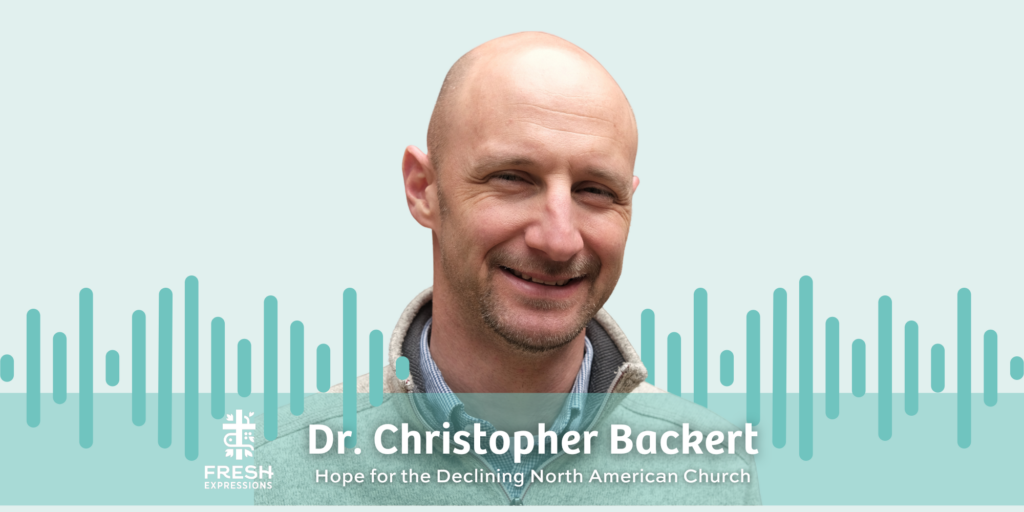Listen
Watch
Show Notes
For years, experts have warned about the decline of the Church in North America, and that was before the pandemic! This episode will help you have a greater understanding of what it means for the North American church to be in decline, and why there’s still hope.
Dr. Chris Backert is the National Director of Fresh Expressions US. Working with church and denominational leaders to develop new expressions of Christian community is the passion of Chris’s life. Chris holds a D.Min. in Missional Church Leadership from Fuller Theological Seminary. He lives in Harrisburg, Pennsylvania with wife Rachel, daughter Elliana and son Jase.
Interview Summary
“It’s not just about what we’re doing; it’s about where God is leading us in these tumultuous times.” As the director of Fresh Expressions in the United States and North America, Dr. Chris Backert brings a wealth of experience and wisdom to the discussion, offering a glimpse into the evolving landscape of the church and its mission in the post-Christendom era.
The Genesis of Fresh Expressions
The story of Fresh Expressions North America began when Dr. Christopher Backert, while studying at Fuller Seminary, encountered the concept during a course on church growth in a post-Christendom context. The movement, which started in the UK, aimed to innovate church planting and revitalization strategies that had lost their effectiveness. Dr. Backert’s visit to the UK revealed the movement’s success in bridging the gap between the church and a post-Christian society, inspiring him to introduce the concept in North America. Fresh Expressions appealed to both new and established churches, demonstrating adaptability across various ecclesiastical contexts.
Adapting to Post-Christendom Challenges
Dr. Backert discussed the movement’s relevance in addressing the challenges faced by the church in a post-Christendom era.
Traditional methods of church growth and revitalization were faltering, prompting a need for a fresh approach.
Fresh Expressions emerged as a solution, fostering new faith communities that could engage effectively with individuals distant from conventional church structures. These communities often formed around localized needs and demographics, offering more intimate and relevant forms of Christian fellowship and worship.
The Impact of the Pandemic on the Church
The COVID-19 pandemic accelerated the existing trends of declining church attendance and engagement, particularly among younger generations. Dr. Backert highlighted the stark reality that many who left the church during the pandemic might not return.
This shift has forced church leaders to confront the need for innovative approaches to ministry and community building, pushing the conversation towards more adaptable and resilient church models.
Renewing the Church’s Mission
Dr. Backert emphasized the concept of remissioning as a vital strategy for church renewal. Unlike re-engineering (which focuses on internal church improvements) or revival (a divine intervention), remissioning is an active, outward-facing approach. It involves creating new, contextually relevant forms of church that engage directly with the unchurched or dechurched populations. This strategy is seen as essential for the church’s future vitality, encouraging a shift from attractional to missional models of church growth.
Dr. Backert’s reflections offer a compelling narrative of transformation and hope.
The Fresh Expressions movement not only addresses the immediate challenges faced by churches but also provides a visionary path for future growth and impact.
As churches navigate the complexities of a post-pandemic world, the principles and practices of Fresh Expressions can serve as a guide for reimagining the church’s role in society.
Reflections Questions:
- How can churches more effectively engage with their local communities in a post-Christendom context?
- In what ways has the pandemic highlighted the need for church renewal and adaptation?
- How does the concept of remissioning challenge traditional church growth and revitalization strategies?
- What role do laity and ordinary church members play in the remissioning process?
- How does the Fresh Expressions movement address the challenges of a post-Christian society?

